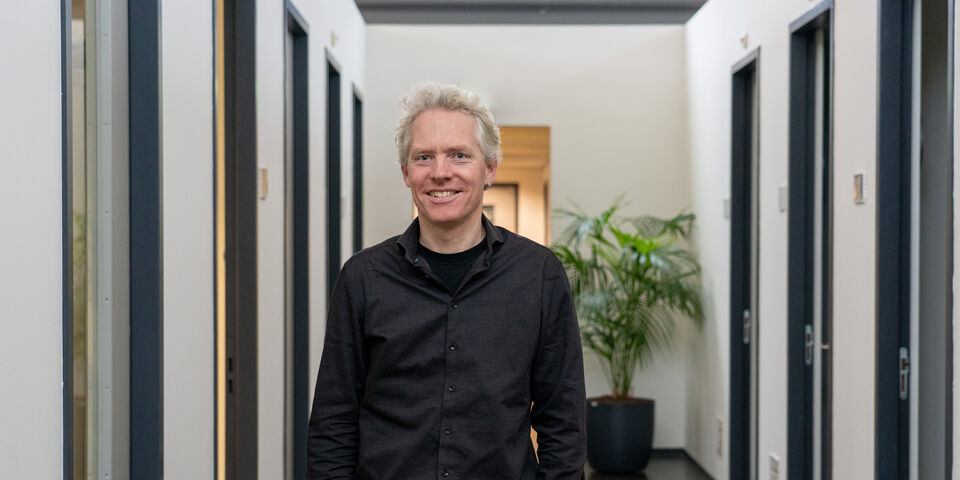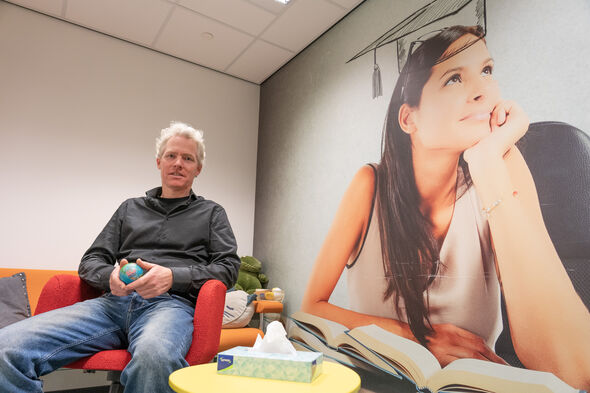Behind the scenes | Stijn van Puijenbroek, PhD counselor
From technicians to schedulers and from IT staff to cafeteria workers: it takes a lot of hands to keep TU/e running smoothly. Who are these people behind the scenes? In this series, Cursor shines the spotlight on TU/e employees. This time: Stijn van Puijenbroek, student counselor as well as PhD-EngD counselor.
If you get stuck in your studies, PhD research, or EngD program for any reason, you can contact the student counselor or PhD-EngD counselor. There you can vent your thoughts in confidence and explore together what steps you can take to find a solution. Stijn van Puijenbroek combines both roles: “As a student counselor, I have five colleagues, but I am the only PhD-EngD counselor at TU/e. I was also the first: when I applied in 2020, it was a new position.”
What time do you clock in?
“When I work on campus, I start at a quarter to nine. Two days a week I work from home and then I begin a little earlier, at eight o'clock. On those days I don't have to take the train to TU/e from my home in Culemborg.”
How did you end up in this job?
“I am a social scientist and, after graduating, I did a few things, including giving training courses on social safety at the Dutch Railways (NS).
After that, I “landed” at HU University of Applied Sciences Utrecht, where I worked as a student counselor for about fourteen years. At the end of that period, I ended up at TU/e on a temporary placement, where I replaced a student counselor on maternity leave.”
“A colleague at TU/e then pointed out the vacancy for the combined position of student counselor and PhD-EngD counselor. That seemed like a challenge to me, firstly because TU/e has a rather international population. And secondly, because I knew from PhD candidates among my friends and family what problems they can run into, such as high work pressure and the dependent relationship with supervisors. This made me want to advocate for this group as well. In addition, thanks to the placement, I had already gained positive experience with the workplace, colleagues, and manager.”
What is the best thing about your job?
“If someone leaves after a talk with me thinking, ‘I can take this further myself now,’ then I'm happy. My focus is on giving the other person tools to take steps themselves. Simply put, what I do is listen carefully and actively, and then work together to create structure. What is the problem? What are the solution options? What can the person do themselves and what requires the help of others? And who and how? And how do you take those steps?”
“Often, after such a conversation, a PhD or EngD candidate can indeed deal with the problem themselves, and it remains a one-off conversation. When they return more often, it is usually due to complex situations such as social unsafety or a strained relationship with supervisors.”
“In fact, as a student counselor, I play a slightly less coaching role, because that function is further down the support chain. The academic advisors at the departments conduct the initial interviews and take on a large part of the guidance.”
And what is the least enjoyable part?
“What I find unfortunate is that, as a PhD-EngD counselor, I don't have a team of direct sparring partners, because I am the only one in that position. With my fellow student counselors and the student psychologists here in the hallway, I can easily exchange ideas about the issues we all encounter. For the issues that PhD and EngD candidates face, this is more difficult.”
“I resolve this by sometimes discussing difficult cases—anonymously—with my manager. And also, I can exchange views with the Dean and policy advisors of the Graduate School on issues that PhD and EngD candidates often encounter. Periodically, I share knowledge and experiences with two fellow PhD counselors at the University of Twente.”
One counselor at TU/e for nearly 2,200 PhD students and 200 EngD students—is that enough?
“If you look at my schedule, you would think so: I don't have any waiting lists, unlike the student counselors. There are about ten slots available each week in Sharepoint, so that PhD and EngD candidates can schedule their own appointments, but those are never fully booked. However, I think there are other factors at play, first and foremost that not everyone knows where to find me yet. My workplace is in MetaForum, so I am not as visible on the departments. It helps if departments mention me in a presentation or show me on the information screens.”
“Furthermore, the academic culture and hierarchical organization also play a role: as a result, researchers are often reluctant to speak out or show vulnerability. I understand that it can be stressful. Imagine as a PhD candidate you have trouble with the way your supervisor presents feedback, or you are frustrated that you never get a response to your emails. When you share that information, you want it to remain confidential. Therefore, confidentiality is paramount.”
“It is unfortunate when a PhD or EngD candidate has delayed seeking help for so long that a problem that once started out small has become unnecessarily large. The same applies to students, by the way, who also often wait a long time before contacting their academic advisor. So the urgent message is: don't wait too long, make an appointment and stop by. Prevention is better than cure.”
What time do you clock out at the end of your workday?
“On my three campus days, I leave for the station a little before five. On the train, I do some reading, answer emails, or work stuff out. On my two days working from home, which are also my part-time days—I work 34 hours—I finish earlier.”
What do you do when you're of the clock?
“At home, I enjoy spending time with my family; we have three children aged 16, 19, and 21. I often go for walks with our two border terriers. They are dogs with a very pleasant character: they are full of energy and can act quite goofy, but they behave very calm and gentle towards people and other dogs.”
“I also enjoy listening to music and attending concerts. And also visiting festivals, because you discover a lot of new music there. The last two I visited were Best Kept Secret and Zeitgeist, a smaller festival in Nijmegen. My taste is broad, leaning towards alternative. Lately, I've been captivated by the performing art form spoken word, which has led me to listen more to rap and hip hop again.”
This article was translated using AI-assisted tools and reviewed by an editor



Discussion